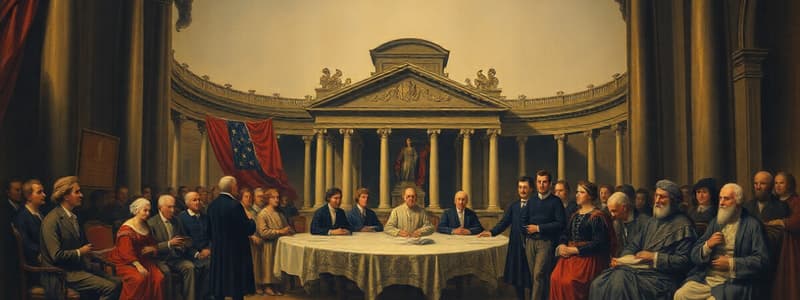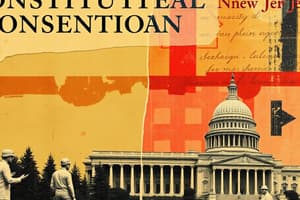Podcast
Questions and Answers
The 'New Jersey Plan' was proposed by William ______, a New Jersey delegate.
The 'New Jersey Plan' was proposed by William ______, a New Jersey delegate.
Paterson
The New Jersey Plan argued for a ______ legislature.
The New Jersey Plan argued for a ______ legislature.
unicameral
In the New Jersey Plan, each state would have ______ vote in the legislature.
In the New Jersey Plan, each state would have ______ vote in the legislature.
one
The New Jersey Plan included a proposal for a national ______, chosen by the legislature.
The New Jersey Plan included a proposal for a national ______, chosen by the legislature.
The New Jersey Plan proposed a national ______, with judges appointed by the executive.
The New Jersey Plan proposed a national ______, with judges appointed by the executive.
The Virginia Plan advocated for a ______ legislature with representation proportional to a state’s population.
The Virginia Plan advocated for a ______ legislature with representation proportional to a state’s population.
The key debate at the Constitutional Convention revolved around state ______ in government.
The key debate at the Constitutional Convention revolved around state ______ in government.
The outcome of the debates led to the ______ Compromise, incorporating elements from both the New Jersey and Virginia Plans.
The outcome of the debates led to the ______ Compromise, incorporating elements from both the New Jersey and Virginia Plans.
The New Jersey Plan aimed for a stronger national government compared to the Articles of ______.
The New Jersey Plan aimed for a stronger national government compared to the Articles of ______.
The New Jersey Plan underscored the complexities of creating a system that satisfied both large and ______ states.
The New Jersey Plan underscored the complexities of creating a system that satisfied both large and ______ states.
Flashcards
New Jersey Plan
New Jersey Plan
A proposal for the structure of the US government, presented at the 1787 Constitutional Convention. It advocated for a unicameral legislature where each state gets one vote, regardless of population size.
Unicameral Legislature
Unicameral Legislature
A one-house legislature, where each state, regardless of population, has a single vote.
Federalism
Federalism
A system where power is shared between a national government and state governments.
Virginia Plan
Virginia Plan
Signup and view all the flashcards
Representation Debate
Representation Debate
Signup and view all the flashcards
Connecticut Compromise (Great Compromise)
Connecticut Compromise (Great Compromise)
Signup and view all the flashcards
States' Sovereignty
States' Sovereignty
Signup and view all the flashcards
Concerns of Smaller States
Concerns of Smaller States
Signup and view all the flashcards
Stronger National Government
Stronger National Government
Signup and view all the flashcards
Balancing Interests
Balancing Interests
Signup and view all the flashcards
Study Notes
Overview
- The "New Jersey Plan" was a proposal for the structure of the United States government presented at the Constitutional Convention of 1787.
- It was proposed by William Paterson, a New Jersey delegate.
- This plan argued for a unicameral legislature, where each state would have an equal vote, hence the name "New Jersey Plan."
- It stood in contrast to the "Virginia Plan," which proposed a bicameral legislature with representation proportional to a state's population.
Key Features of the New Jersey Plan
- Called for a unicameral (one-house) legislature.
- Each state, regardless of its population size, would have one vote in the legislature.
- The legislature would have the power to raise revenue through taxes and duties.
- It proposed a national executive, chosen by the legislature.
- It proposed a national judiciary, with judges appointed by the executive.
- A strengthened national government compared to the Articles of Confederation.
Contrast with the Virginia Plan
- The Virginia Plan advocated for a bicameral legislature (two houses).
- Representation in the legislature would be proportional to a state's population.
- Bigger states would have more power in the legislative branch.
Significance
- The New Jersey plan was an important counterpoint to the Virginia Plan, showcasing the different interests and priorities of the states.
- It highlighted the concerns of smaller states about being overshadowed by larger states in a national government.
- A key debate at the Constitutional Convention revolved around the differing viewpoints about state representation.
- The final outcome was a compromise that included elements from both plans (the Connecticut Compromise), leading to the structure of the United States Congress we know today.
Implications
- The debate over representation demonstrated the difficulty in balancing the interests of different states during the formation of the nation.
- The New Jersey Plan reflected a desire for a more unified national government within a framework that respected the sovereignty and equality of states.
- It underscored the complexities of creating a system that satisfied both large and small states.
Studying That Suits You
Use AI to generate personalized quizzes and flashcards to suit your learning preferences.




